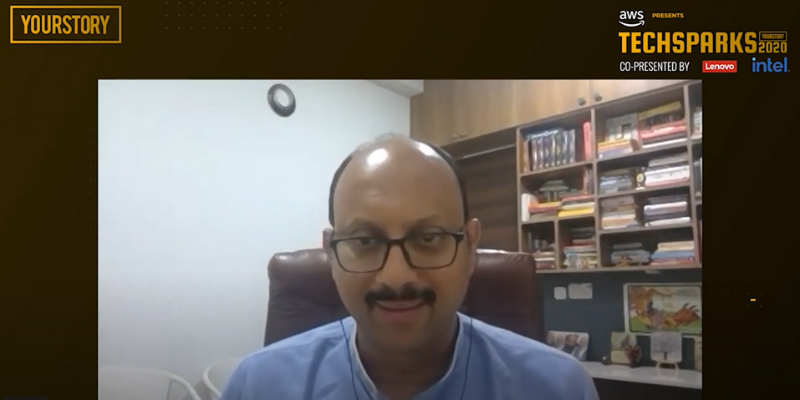India comprises over 6.5 lakh villages, with over 400 million consumers living in just 6,500 of them. With an increasing demand for quality products and services, Madan Padaki, Co-founder and CEO of 1Bridge, one of India’s leading entrepreneurs championing the cause of rural consumers, throws light on the role of rural India in creating a $5 trillion GDP by 2024.
At the 11th edition of YourStory’s flagship event TechSparks 2020, Madan highlighted the potential of rural India, the challenges in catering to the consumers in rural and suburban areas, and accelerating the expansion of agronomic markets.

Madan talking about the potential of rural Indian markets as part of a masterclass in TechSparks 2020.
In 2000, Madan co-founded MeritTrac, a leading skill assessment startup. He has been working towards better job creation for the youth and boosting rural development.
Presently, Madan is heading 1Bridge — a rural last-mile ecommerce platform — that connects rural consumers with suppliers.
Speaking in a masterclass titled, “View from the trenches: deep-diving into the rural economy at the village level,” Madan said,
“A lot of retail giants are eyeing India's consumer base. The top 10 percent of people living in rural areas earn about Rs 10 lakh per annum, the middle 50 percent garner Rs 3 lakh, and the bottom 40 percent get Rs 1 lakh. Hence, many of them have the purchasing power, especially to spend on essential products and services. This, in turn, paves the way for the growth of the FMCG sector.”
Recently, Madan visited a small village near Bannur, Mysuru, and spoke to a farmer couple, who not only said they bought a smartphone on an ecommerce site but were also ready and willing to explore online education for their children.

Image credit: YS Design.
This way, he got to witness first-hand the aspirations of rural India to move up the value chain and create a better future for children. Nevertheless, Madan did not rule out that there were challenges on the road to fulfilling these dreams.
“Some of the hurdles in adopting newer ways of transacting include lack of knowledge to use mobile applications, the perception that offline sellers are more reliable, fear of poor after-sales service, inadequate awareness about brands, and an overall dearth of trust," he said.
“While some rural consumers have already overcome these, others continue to face it even today,” he added.
Today, villages across the country have small retail stores and business setups like salons, xerox shops, etc. Most of these are owned and run by middle-aged entrepreneurs, who owing to the nature of their work, know how to use gadgets and are well-versed with technology.
Supporting this, Madan talks about the value chain – where there is a supply-side (ecommerce, FMCG, durables, fintech), a demand-side (rural households), and the village entrepreneurs — who are digitally savvy and trusted within the community.

Madan Padaki, Founder and CEO, 1Bridge.
Image credit: YS Design.
With this channel in mind, he established 1Bridge, an assisted ecommerce platform, that curates products and services based on the demands of rural consumers through a local network of entrepreneurs.
“Some of the significant aspects we had to concentrate on while building this model were conceiving a good consumer experience by building trust, ensuring commitments from the supply side, making an impact in the lives of entrepreneurs, and simplifying the technology interface on the 1Bridge advisory app,” Madan notes.
At every point of interaction, the platform also taps into data for improved supply-side optimisation, better consumer insights, and identification of demand patterns.
The implementation of the 1Bridge model at the ground level happens through the creation of a district hub, a few experience zones at the talukas that act as touchpoints, and the local entrepreneurs residing in the village. Presently, 1Bridge operates in about 65 districts across Karnataka, Andhra Pradesh, Maharashtra, Telangana, Tamil Nadu, and Odisha.
A few months ago, 1Bridge built a virtual reality showroom for rural consumers, where Google cardboards and apps on the phones of local entrepreneurs were used to display tractors, TVs, and home appliances, among others. The data from the experiment was, in turn, used to assess the interest of consumers.
“Using a multi-stacked model seems like the way to assure progress when it comes to tapping rural markets. And, corporate India is already looking at rural areas as a harbinger for growth,” he said.
For more information on TechSparks 2020, check out our TechSparks 2020 website. Sign up here to join the event.
TechSparks - YourStory's annual flagship event - has been India's largest and most important technology, innovation, and entrepreneurship summit for over a decade, bringing together entrepreneurs, policymakers, technologists, investors, mentors, and business leaders for stories, conversations, collaborations, and connections that matter. As TechSparks 2020 goes all virtual and global in its 11th edition, we want to thank you for the tremendous support we've received from all of you throughout our journey and give a huge shoutout to our sponsors of TechSparks 2020.
Edited by Suman Singh
Link : https://yourstory.com/2020/10/techsparks-2020-rural-india-villages-entrepreneurs-economy
Author :- Roshni Balaji ( )
October 29, 2020 at 07:00AM
YourStory



